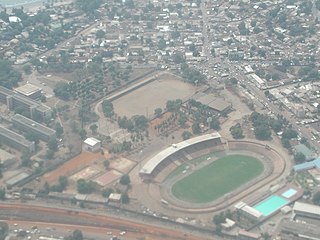The modern state of Guinea did not come into existence until 1958, but the history of the area stretches back well before European colonization. Its current boundaries were determined during the colonial period by the Berlin Conference (1884–1885) and the French, who ruled Guinea until 1958.

Politics of Guinea takes place in a framework of a presidential representative democratic republic, whereby the President of Guinea is both head of state and head of government of Guinea. Executive power is exercised by the government. Legislative power is vested in both the government and the National Assembly.

Conakry is the capital and largest city of Guinea. A port city, it serves as the economic, financial and cultural centre of Guinea. Its population as of the 2014 Guinea census was 1,660,973.

Lansana Conté was a Guinean politician and military official who served as the second president of Guinea from 1984 until his death in 2008. Conté came to power in the 1984 Guinean coup d'état.

Cellou Dalein Diallo is a Guinean economist and politician who was Prime Minister of Guinea from 2004 to 2006. Previously he held a succession of ministerial posts in the government from 1996 to 2004. Currently he is President of the Union of Democratic Forces of Guinea (UFDG), an opposition party. He was a candidate in the 2020 Guinean presidential election but lost to incumbent Alpha Condé.

Alpha Condé is a Guinean politician who served as the fourth president of Guinea from 2010 to 2021.

Stade du 28 Septembre is a multi-purpose stadium in Conakry, Guinea. It is currently used mostly for football matches. The stadium has a capacity of 25,000 people.

Sidya Touré is a Guinean politician. He was Prime Minister of Guinea from 1996 to 1999 and is currently the president of the Union of Republican Forces (UFR), an opposition party.

On 23 December 2008, a coup d'état occurred in Guinea, shortly after the death of long-time president Lansana Conté. A junta called the National Council for Democracy and Development, headed by Captain Moussa Dadis Camara, seized power and announced that it planned to rule the country for two years prior to a new presidential election. Camara did indeed step down after Alpha Condé was elected in the 2010 election.

Captain Moussa Dadis Camara, now called Moïse Dadis Camara, is an ex-officer of the Guinean army who served as the President of Guinea from 23 December 2008 to 15 January 2010. He was the leader of the National Council for Democracy and Development, which seized power in a military coup d'état on 23 December 2008 shortly after the death of long-time president Lansana Conté.

The National Council for Democracy and Development was the ruling junta of Guinea from 2008 to 2010.

Presidential elections were held in Guinea in 2010. They were held under the two-round system, with the first round taking place on 27 June 2010 and the second round on 7 November, after an initial date of 18 July and several other postponements. Alpha Condé was declared the winner, with 52.52% of the votes in the second round. He assumed office on 21 December 2010.
The 2009 Guinean protests were an opposition rally in Conakry, Guinea on Monday, 28 September 2009, with about 50,000 participants protesting against the junta government that came to power after the Guinean coup d'état of December 2008. The protest march was fueled by the indication of junta leader Captain Moussa Dadis Camara breaking his pledge to not run in the next presidential vote due in January 2010. The government had already banned any form of protests until 2 October. When the demonstrators gathered in a large stadium, the security forces opened fire at them. At least 157 demonstrators were killed, 1,253 injured and 30, including Cellou Dalein Diallo, the leader of the opposition Union of Democratic Forces of Guinea (UDFG), were arrested and taken away in lorries.
General Sékouba Konaté is an officer of the Guinean army who formerly served as the vice president of its military junta, the National Council for Democracy and Development. After attending military academy, he received the nickname "El Tigre" for his action in battle, and gained such popularity with the people he was favored to be president of the government. However, he was appointed vice president; but took control of the country when the president was shot in December 2009.
Colonel Claude Pivi is a Guinean military and political figure, member of the National Council for Democracy and Development (CNDD) and a Minister since December 2008. In 2013 he was charged in connection with the Guinea stadium massacre of 28 September 2009, in which 157 were killed by troops. The BBC describe Pivi as a "leading figure in the CNDD military junta led by Captain Moussa Dadis Camara at the time of the massacre". In November 2023, he was broken out of prison by armed commandos allegedly led by his son. The Guinean junta promised a reward of 54,000 euros for the capture of Claude Pivi.

The 1984 Guinean coup d'état was the bloodless military coup that took place in Guinea on 3 April 1984, led by Colonel Lansana Conté. It led to the deposition of Prime Minister Louis Lansana Beavogui, who had held the office since 1972, and had been serving as interim president since March, when longtime President Ahmed Sékou Touré died during an emergency heart operation at the Cleveland Clinic in the United States.

Conakry central prison is a prison in Guinea located in the capital Conakry, in the commune of Kaloum.
Events in the year 2023 in Guinea.
Events in the year 2024 in Guinea.
On 18 December 2023, an explosion and fire broke out at an oil depot in Conakry, Guinea, killing at least 24 people and injuring 454 and resulting in fuel shortages across the country.











